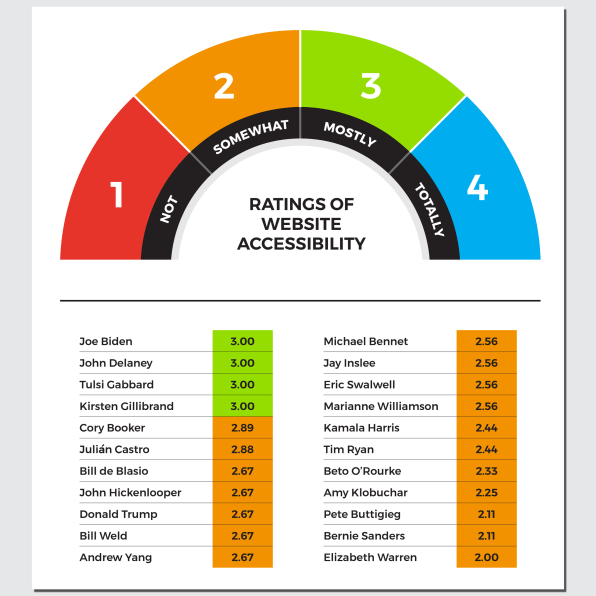The presidential debates in Miami this week would seem to be a chance for candidates to educate voters and set themselves apart from the pack. But already every single candidate appears to be falling short on one major issue: No one has ensured that blind and people with visual impairments can follow up for more information on their websites. That’s a pretty big oversight in the age of Fake News and general bloviating.
The finding comes from a new report by the rehabilitation and career services organization Miami Lighthouse for the Blind and Visually Impaired. Foremost, none of the candidates’ sites appear to be complaint with the Americans With Disabilities Act of 1990, granting equal access to physical and digital spaces. While the law was initially written to address access to businesses and public spaces, it’s since been interpreted to apply to the online world, especially when the destination involves a governmental agency, representative, or public issues.
In addition to not featuring the most basic corrective fix—keystroke-activated audio screen readers—all of the candidates did not include equally simple features like the ability to adjust screen font sizes or contrast. And none provided contact information to help people with visual impairments navigate those poorly designed sites.

“When it’s not accessible really the monitor is just a piece of glass,” says Virginia Jacko, the president and CEO of Miami Lighthouse, who is also blind. Jacko considers this oversight indicative of two major problems with early primary thinking: Yes, it’s a general disregard for long-standing standards codified by an actual law. It’s also a total lack or recognition that aging boomers—a large pool of potential voters—may struggle with eyesight issues.
“There are about 12 million people over the age of 40 with uncorrectable vision loss,” she says. “They may not be blind, but seniors might want to adjust the size of the font. They may want to have better contrast. So in reality, that means about 12 million voters are not able to have the same information as those people that have perfect eyesight. And that is just plain wrong.”
Candidate sites were graded in many individual categories including overall ease of navigation, how headings are structured, and if links can be activated by keystroke commands. All of it was then ranked on a four-point scale of accessibility representing whether the site was not, somewhat, mostly, or totally accessible. Miami Lighthouse’s internal IT team led the effort. All of them are blind.
While no one received a perfect score, contenders Joe Biden, John Delaney, Tulsi Gabbard, and Kirsten Gillibrand ranked the highest overall. The incumbent Donald Trump finished in the middle of the pack. Those who scored lowest were Amy Klobuchar, Pete Buttigieg, Bernie Sanders, and Elizabeth Warren in descending order.
Jacko figures the time to change that is right now. “This is my challenge to all of the candidates: They can be the change agents, they can be the leader and they could make a commitment for very low cost,” she says. So far that appears to be working. Miami Lighthouse furnished all candidates an advanced copy of the report. As of Wednesday morning, Andrew Yang and Elizabeth Warren’s teams had responded with an interest in making corrections.
(15)